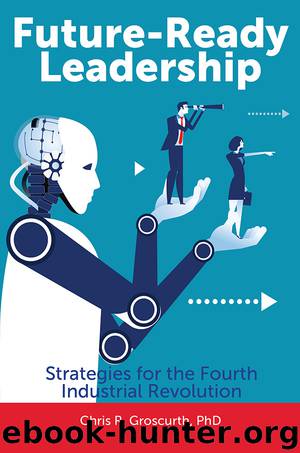Future-Ready Leadership by Chris R. Groscurth

Author:Chris R. Groscurth
Language: eng
Format: epub
Publisher: ABC-CLIO
Collaborative Advantage Requires Upskilling Team Leaders and HR
As stated previously, if your senior leaders fail to model good collaboration, then collaboration won’t take root in your organization. But make no mistake: the buck doesn’t stop with senior leaders. Good communication and collaboration are capabilities and skills that must be built throughout all levels of smart, connected organizations. Everyone in your organization is going to have to get better at building, maintaining, and managing relationships and power across their collaborative partnerships.
Regardless of your organization’s structure, team leaders will play critical roles in helping senior leaders capitalize on their organizational effectiveness/design/restructuring investment. Team leaders need to develop new mindsets and skills around collaboration to execute strategies and implement priorities set by senior leaders. If collaboration and new organizational design, such as the networked organization, are the new normal, then team leaders are the new “middle management,” and they will play critical roles in fostering collaboration.
The “management” practices of previous industrial eras (that is, control, monitoring, disciplining, administrating, and so on) are less and less valuable each day as automation and smart, connected technologies and processes simplify the employee experience. Traditional “personnel management” is becoming obsolete. In fact, I would go so far as to argue that the majority of personnel management practices, and even entire human resources models, of previous eras will soon be obsolete. HR technologies and “employee self-service” capabilities are transforming the roles of HR leaders and HR business partners in more productive and strategic directions. As their transactional work is automated and knowledge work becomes more complex, smart, connected HR leaders will become invaluable resources as consultants and coaches for senior leaders and team leaders on topics related to strategic workforce planning, people analytics, organizational design and effectiveness, leading high-velocity change, and improving team efficiency and effectiveness.
In the last five years alone, I’ve helped a number of clients “upskill” team leaders and HR leaders, equipping them with a “consulting playbook” and skills around team and organizational development. One role of strategic HR advisers will be to equip team leaders with analytics and coaching for responding to uncertainty and high-velocity change. These strategic advisory and process consulting skills enable functional leaders to “own” leadership and team development more directly within their business unit or department.
My practical experience of working with organizations to build collaboration skills and strategic consulting “horsepower” among HR practitioners is consistent with Richard and Daniel Susskind’s predictions in their book, The Future of the Professions: How Technology Will Transform the Work of Human Experts.3 These researchers argue that we are on the brink of a fundamental and irreversible shift in how the expertise of professions like accountants and management consultants is deployed and used. From firsthand experience, I believe the increased demand to teach the methodologies and analytics of team collaboration, organization design, and so on to corporate function leaders (e.g., those in HR, finance, operations, project management, etc.) is evidence of an evolution of these professions. This evolution is occurring in response to business demand for
Download
This site does not store any files on its server. We only index and link to content provided by other sites. Please contact the content providers to delete copyright contents if any and email us, we'll remove relevant links or contents immediately.
Nudge - Improving Decisions about Health, Wealth, and Happiness by Thaler Sunstein(7707)
Deep Work by Cal Newport(7085)
Principles: Life and Work by Ray Dalio(6449)
The Doodle Revolution by Sunni Brown(4761)
Factfulness: Ten Reasons We're Wrong About the World – and Why Things Are Better Than You Think by Hans Rosling(4742)
Eat That Frog! by Brian Tracy(4540)
Thinking in Bets by Annie Duke(4227)
Hyperfocus by Chris Bailey(4118)
Visual Intelligence by Amy E. Herman(3782)
Writing Your Dissertation in Fifteen Minutes a Day by Joan Bolker(3729)
Ogilvy on Advertising by David Ogilvy(3622)
Hidden Persuasion: 33 psychological influence techniques in advertising by Marc Andrews & Matthijs van Leeuwen & Rick van Baaren(3565)
How to Win Friends and Influence People in the Digital Age by Dale Carnegie & Associates(3562)
How to win friends and influence people by Dale Carnegie(3474)
The Pixar Touch by David A. Price(3439)
Schaum's Quick Guide to Writing Great Short Stories by Margaret Lucke(3381)
Deep Work: Rules for Focused Success in a Distracted World by Cal Newport(3237)
Work Clean by Dan Charnas(3123)
The Slow Fix: Solve Problems, Work Smarter, and Live Better In a World Addicted to Speed by Carl Honore(3009)
